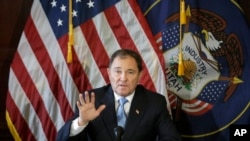In declaring that pornography is a "public health crisis," Utah has set a precedent in the United States and taken aim at an industry "contributing to the hypersexualization of teens and even prepubescent children," as a new law says.
"We are sounding a voice of warning. There are real health risks that are associated with viewing pornography," Governor Gary Herbert said in signing two anti-porn bills into law Tuesday.
One, technically a resolution, confronts "the pornography epidemic." As Herbert said, it calls for "additional research and education so that more individuals and families are aware of the harmful effects of pornography."
The second requires computer technicians to report child pornography to authorities or face a possible misdemeanor charge.
Neither measure outlaws pornography. The U.S. Supreme Court has determined that most pornography is protected by the First Amendment, except hardcore porn that fails obscenity tests, or any pornography involving children.
Pornography 'addiction'
State Senator Todd Weiler, a Republican who sponsored both measures, urged other states to follow suit in limiting porn.
A policy specialist for the National Conference of State Legislatures, Pam Greenberg, said she knew of only one state — Tennessee — that was considering a similar resolution.
The resolution contends that pornography "equates violence toward women and children with sex, and pain with pleasure, which increases the demand for sex trafficking, prostitution, child sexual abuse images, and child pornography."
Herbert, at the signing, compared pornography to alcohol and other drugs, saying "there is a particular psychological and physiological detriment that comes from addiction to pornography."
The anti-porn group Fight the New Drug applauded the new measures. It has likened porn to tobacco, saying that a growing body of evidence points to health hazards — especially for kids. A campaign against tobacco has curbed access to youngsters.
"We go across the country to present in middle schools. You can imagine how heartbreaking it is to have seventh-grade boys coming up, with tears in their eyes, to say they're viewing things that are gross," said Robbie Tripp, marketing director for the group.
"We are big supporters of the resolution, mainly because it focuses heavily — entirely — on education and awareness," Tripp added. "This is not a bill restricting people's rights or taking away their ability to view legal forms of pornography."
Fight the New Drug is based in Salt Lake City and, Tripp said, is apolitical and unaffiliated with any religion. It denies any links to the Mormon church, which is based in Utah and where almost two-thirds of residents are Mormons.
Danger vs. ignorance
The Free Speech Coalition, which advocates for adult entertainment interests, said the new child pornography measures were "old-fashioned" and created out of ignorance.
The resolution presents as fact some information that doesn't have firm scientific underpinnings, James Hamblin wrote in The Atlantic last week.
For instance, it says "pornography use is linked to lessening desire in young men to marry, dissatisfaction in marriage and infidelity."
Hamblin cited research indicating "watching pornography did not seem to kill love, but … increased the desire for sex with their partners."
Hamblin studied the bill’s evolution, tracing it to Gail Dines, a sociology professor at Wheelock College in Boston and author of Pornland: How Porn Has Hijacked Our Sexuality. Earlier this month, she wrote a column for The Washington Post positioning porn not as a moral issue, but as a public health crisis.
Dines has promoted that same anti-porn strategy in discussions with health officials in Canada, Iceland and Poland, according to Hamblin's Atlantic account. Last July, she brought her message to Washington, where Weiler — the Utah state senator — heard her speak at an anti-porn summit at the U.S. Capitol. Afterward, the legislator "returned to his home state to champion the bill."
Dines' op-ed drew opposition.
"Her work has been criticized for cherry-picking information that appears to support her animus toward porn, for ignoring counter-evidence, and for making gross generalizations about the supposed effects of porn on viewers, the harms of working in the industry, and the very content of pornography," George Washington University sociology professor Ronald Weizer wrote in a letter published by the Post.
The American Academy of Pediatrics, in a 2010 policy statement, noted that the Internet "has become an abundant source of both sexual information and pornography" for youths and that nine longitudinal studies suggest "sexy media contribute to early sexual activity," considered a health risk.
The academy also called for comprehensive sex education.
Utah emphasizes "abstinence first" lessons. Its legislature voted down a measure enabling parents to opt in for more explicit education for their children. That was in February, the same month the anti-pornography bill was introduced.
The free website Pornhub, one of the largest and most popular pornography streaming sites, bragged that, in 2015, it drew 21.5 billion visits and "streamed 75GB of data a second, which translates to enough porn to fill the storage in around 175 million 16GB iPhones." Its site draws most heavily from the United States — about 41 percent of users.
Porn represents a $97 billion industry annually, of which at least $10 billion comes from the United States, NBC News reported, citing a New Mexico State University sociologist.








